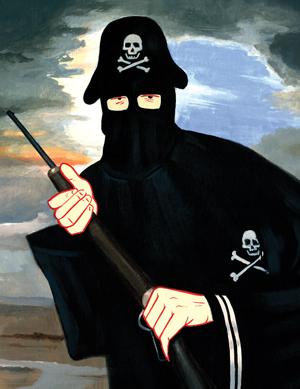White supremacists of the 1930s maintained there was one sure way to identify a fellow member of the “master race” — blushing. It was thought that only a true pureblood Aryan could display a noticeable change of color in their skin upon an episode of shyness, shame, or modesty. That Charley Poole was a non-Aryan was not the real issue with the Black Legion, which saw to it that his cheeks were eternally blanched for a different, more powerful reason: the sanctity of Protestant womanhood. On the night of May 12, 1936, the young unemployed autoworker was taken into the countryside west of Detroit and shot five times at point-blank range, an honor killing that was the latest in a long string of atrocities committed by the black-robed vigilantes.
“Nobody could hate Charley,” cried Becky Poole, after being told by detectives that her husband’s body had been found near Gulley Road in what is now Dearborn Heights. “He never hurt anyone in his whole life.”
That wasn’t what the local chapter of the Legion — which included Becky’s brother-in-law, Lowell Rushing — believed. Rushing had gotten wind of Charley’s occasional arguments with Becky and reported back to his friends at the Wolverine Republican Club, one of various fronts the Legion used to mask its activities. He exaggerated the Pooles’ discord, which typically centered on Charley’s inability to find a steady job. At a secret meeting inside a rented hall, “Colonel” Harvey Davis helped stir Legionnaires into a frenzy by describing Charley as an abusive husband who had beaten his pregnant wife so badly she had miscarried. “What shall we do about such a man?” he asked. “Whip him!” members yelled. “Kill him!”
The following evening, as Becky lay in her bed at Detroit’s Herman Kiefer Hospital, Rushing lured Charley into a car filled with Legion members. Charley, a talented sandlot ball player, thought he had been invited to the organizational meeting of a factory baseball team, which would have assured him a job at the sponsoring plant. But, in the hard-boiled vernacular of the day, this was a one-way ride. “You’ve beaten your wife for the last time,” he was told before being shot and dumped into a ditch.
As unremarkable as Poole’s life had been up to that point, in death he wound up extracting an extraordinary price from his killers. His murder caused the previously unknown Black Legion to explode into the headlines, resulting in most of its leaders being sent to prison and exposing the clandestine brotherhood of bullies to ridicule. “Hooey may look like romance and adventure in the moonlight,” The Detroit News editorialized toward the end of the Legion’s brief but spectacular appearance on the public stage, “but it always looks like hooey when you bring it out in the daylight.” (more...)
The Dark Days of the Black Legion
From Wikipedia:
Black Legion (political movement)


No comments:
Post a Comment